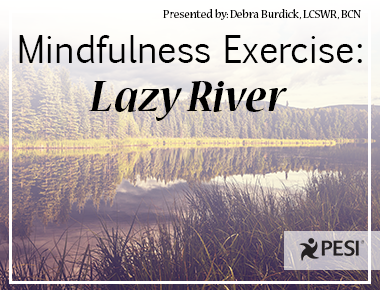The Lazy River: An Exercise in Mindfulness
įŇņ÷ ”∆Ķinc

The following is an excerpt from Mindfulness Skills for Kids & Teens by įŇņ÷ ”∆Ķ author Debra Burdick, LCSWR, BCN.
We all have a steady stream of thoughts and feelings. One of the basic skills in mindfulness is noticing thoughts, feelings, or sensations, dismissing them without engaging in them, and bringing our attention back to our intended target of attention. This tool provides an effective way to practice dismissing them and noticing the next ones that come along.
Use the¬†simple ¬†with your¬†clients to help¬†them learn to notice and dismiss thoughts without engaging in them. Explain that you are going¬†to pretend that thoughts, feelings, and bodily sensations are riding in rafts or boats on a lazy¬†river. The goal is to notice them, but to just let them float by without getting in the boat or raft¬†(engaging with them). They can picture words written on the side of the boat or raft if they like.¬†One of my clients used this skill to stop obsessing about a mean classmate. She imagined her classmate‚Äôs¬†name written on the side of a raft and just watched it float by without ‚Äúgetting in the raft.‚ÄĚ She was¬†able to allow thoughts about the classmate to go without getting into all the feelings of anger she had¬†been experiencing. Using this process, the client was¬†able to very quickly¬†stop the obsessive thoughts.
After clients have practiced this imagery you might add a step where they find a boat or raft with¬†something positive written on it. When they see the positive one come by they can imagine that¬†they get in that boat or raft and float with the positive thoughts or feelings that go with it. For¬†example, they let the boats or rafts that have something in them that upsets them go by, but¬†they can get in a boat or raft that is associated with something that feels good. In other words,¬†let the ‚Äúanger‚ÄĚ boats go by, but get in the ‚Äúhappy‚ÄĚ boat.
Help clients reflect on what this exercise was like for them:
This exercise can be a great doorway to a discussion of what the client is holding onto that may need to go.
We all have a steady stream of thoughts and feelings. One of the basic skills in mindfulness is noticing thoughts, feelings, or sensations, dismissing them without engaging in them, and bringing our attention back to our intended target of attention. This tool provides an effective way to practice dismissing them and noticing the next ones that come along.
Use the¬†simple ¬†with your¬†clients to help¬†them learn to notice and dismiss thoughts without engaging in them. Explain that you are going¬†to pretend that thoughts, feelings, and bodily sensations are riding in rafts or boats on a lazy¬†river. The goal is to notice them, but to just let them float by without getting in the boat or raft¬†(engaging with them). They can picture words written on the side of the boat or raft if they like.¬†One of my clients used this skill to stop obsessing about a mean classmate. She imagined her classmate‚Äôs¬†name written on the side of a raft and just watched it float by without ‚Äúgetting in the raft.‚ÄĚ She was¬†able to allow thoughts about the classmate to go without getting into all the feelings of anger she had¬†been experiencing. Using this process, the client was¬†able to very quickly¬†stop the obsessive thoughts.
After clients have practiced this imagery you might add a step where they find a boat or raft with¬†something positive written on it. When they see the positive one come by they can imagine that¬†they get in that boat or raft and float with the positive thoughts or feelings that go with it. For¬†example, they let the boats or rafts that have something in them that upsets them go by, but¬†they can get in a boat or raft that is associated with something that feels good. In other words,¬†let the ‚Äúanger‚ÄĚ boats go by, but get in the ‚Äúhappy‚ÄĚ boat.
Help clients reflect on what this exercise was like for them:
- Were they able to imagine the lazy river?
- Did they imagine boats or rafts or both?
- Did they notice any thoughts or feelings or bodily sensations riding in the rafts or boats?
- What came up for them while they did this exercise?
- Did any of the rafts or boats have words written on them and, if so, what were they?
- Were they able to let the rafts and boats float by?
- Did they get in any of the rafts or boats and, if so, which one(s)?
This exercise can be a great doorway to a discussion of what the client is holding onto that may need to go.
Want more mindfulness skills for everyday use? Visit Debra Burdick's website: .


